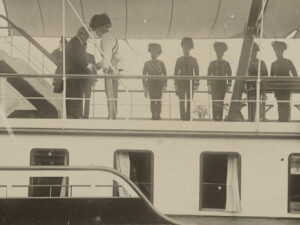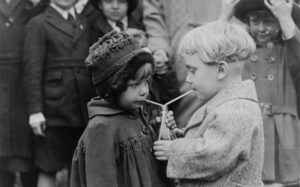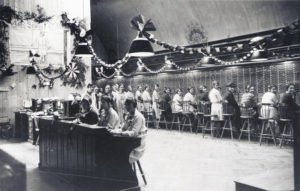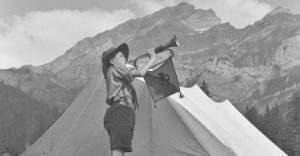
Swiss National Museum/ASL
The Boy Scouts
Switzerland’s Boy Scouts and Girl Guides have been around for more than 100 years. The organisation’s basic ideas came from the military, and spread rapidly across the globe.
In 1910, the first Scout groups were founded in Switzerland. The idea came from Robert Baden-Powell, a British Army officer, who in 1907 organised a camp for boys for the first time. The 21 ‘Boy Scouts’ spent ten days on Brownsea Island off the south coast of England, mostly doing outdoor activities. Since the boys came from different social classes, they wore uniforms to cover up these differences, externally at least. Baden-Powell wrote up the experiences on Brownsea in a series of articles that was printed in a newspaper. These articles later became the book ‘Scouting for Boys’. With a total of around 150 million copies in print, the work is one of the most printed books in the world.
The founder of the Scouting movement is still admired today, and was nominated several times for a Nobel Prize. However, Robert Baden-Powell was more than just a patron of young people. As an officer in the British Army he was involved in the colonial Boer War in South Africa, where between 1899 and 1900 he defended the town of Mafeking against the Boers, who vastly outnumbered his own troops. He succeeded in this mainly by a cunning deception: he tricked the enemy into believing he had a much larger number of soldiers than actually existed. As a result, the Boers didn’t dare to launch an attack, and when reinforcements finally arrived after more than 200 days, they were able to be pushed back.
To defend Mafeking, every man was needed. So boys aged nine and upwards were drafted in to perform certain lighter duties. They acted as messengers or observed the movements of the Boer troops. The young ‘soldiers’ did their job so well that Baden-Powell decided to write a book about it. Augmented with tips and tricks on subjects such as hunting, tracking and medicine which the Briton had learned from the African peoples, the result was ‘Aids for Scouting’. The work was intended as an instruction manual for military reconnaissance troops, but it found an enthusiastic readership among young people in Great Britain, and pirate copies were even made.
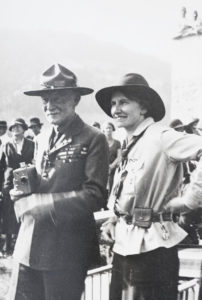
Robert Baden-Powell on a visit to Switzerland, 1932.
Swiss National Museum
IDEAS SPREAD RAPIDLY
The interest from young people took Baden-Powell by surprise. He decided to adapt the work. After the 1907 camp, which he used as a test, he published his adapted version. Baden-Powell’s ideas were not only received enthusiastically in the UK, but also spread rapidly and were very soon taken up by girls as well. In 1910 the first Scout troops were formed in Switzerland, and a year later the first Scouting organisations appeared. The movement was especially popular in the towns and cities. In October 1913, the associations from the cantons of Geneva, Vaud, Neuchâtel, Bern, Basel, Zurich and the combined St. Gallen/Thurgau group established the Schweizerische Pfadfinderbund (Federation of Swiss Scouts, SPB). This was followed in 1919 by the formation of the Bund der Schweizer Pfadfinderinnen (Federation of Swiss Girl Guides, BSP).
During the First World War, but even more so during the Second World War, Scouts and Guides were on hand to act as voluntary helpers. For example, they assisted the Red Cross or acted as messengers and office hands. Purely military services were not part of their duties. In Germany, numerous Scout associations were incorporated into the Hitler Youth. However, as this did not go entirely smoothly, the movement was finally banned in 1938.
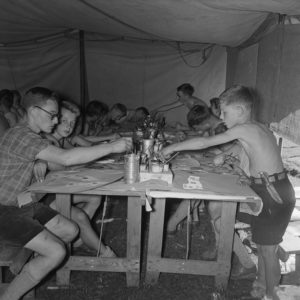
Fifth National Scout Jamboree, in Saignelégier, 1956.
Swiss National Museum/ASL
MANY FAMOUS SCOUTS AND GUIDES
After the Second World War, the Swiss Scouting movement continued to grow. Although the upheavals in youth culture in the 1960s slowed its growth, just a decade later it was on the rise again. Scores of well-known public figures, such as stand-up comedian Beat Schlatter, Ellen Ringier and former Federal Councillor Otto Stich, were in the Scouts or Guides. Many celebrities have continued to work for the Scout movement even after ceasing to be Scouts or Guides themselves – as a member of a patronage committee, or on the board of trustees of the Pfadibewegung Schweiz (Swiss Guide and Scout Movement, PBS), for example. This organisation was created in 1987 from various Swiss associations and today represents around 47,000 members, divided into 22 cantonal associations. The PBS is also responsible for Swiss representation at Scout Jamborees. These international Scout meetings are held every four years, attracting tens of thousands of Scouts and Guides. The 2019 Jamboree is taking place in West Virginia, and will go on until 2 August.
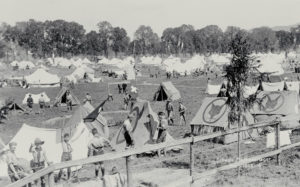
Boy Scout camp in Bern, 1925.
Swiss National Museum
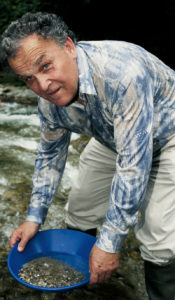
Even former Federal Councillor Otto Stich was once a Scout. He demonstrated his manual skills on the 1995 Federal Councillors’ excursion.
Swiss National Museum/ASL

